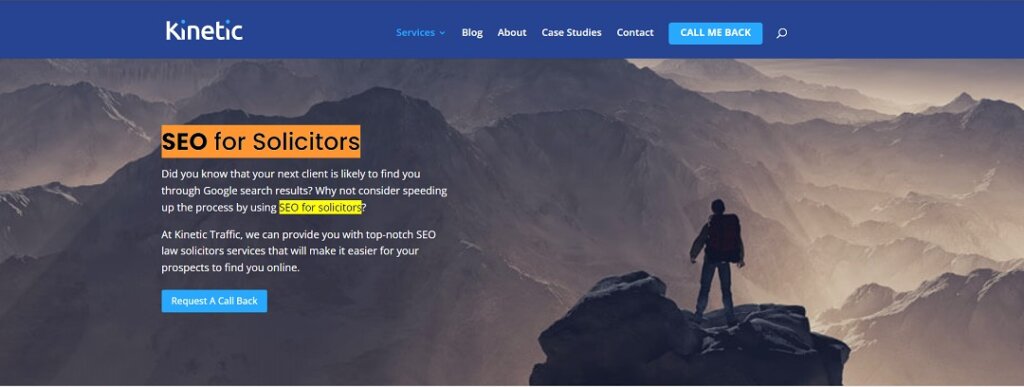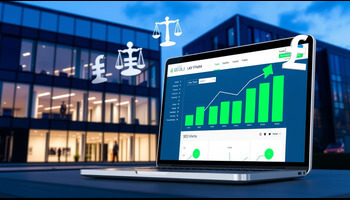14 Key SEO Terms You Need to Know
Because search engine optimisation has the power to transform your law firm, you must know and understand key SEO terms.
When you rank at the top of search engine results pages for your chosen terms and queries, you will find a huge amount of traffic, leads and enquiries coming your way.
However, to those who are unfamiliar with the world of SEO, all of the terminology can feel overwhelming. And with many cowboy SEO firms out there looking to take advantage of law firms, it’s important that you have at least a basic idea of what you’re talking about when hiring an expert.
With that in mind, we at Kinetic Traffic have put together a list of 14 essential SEO terms and broken them down for you.
Contents
#1 – Algorithm
An algorithm is a set of rules or instructions that are followed in order to complete a task. Google algorithms are constantly changing and being updated, which means that what may have worked last year, may not work this year.
Some of the most recent algorithm changes include:
- The Mobilegeddon Update, which favoured mobile-friendly websites.
- The Penguin Update, which targeted websites that were using black hat SEO techniques, such as keyword stuffing, and penalised them accordingly.
- The Pigeon Update, which improved the local search results by providing more relevant and accurate results.
If you want to stay ahead of the game, it’s important to be aware of these algorithm changes and ensure that your website is compliant.
#2 – Anchor Text
Anchor text is the visible, clickable text in a hyperlink. When creating links, it is important to use keywords that accurately describe the page you are linking to. This will help search engines understand what the target page is about and will improve your website’s ranking for those keywords.
For example, if you are linking to a page about personal injury law, the anchor text should be something like “personal injury law” or “injury lawyer”.
However, you also want to avoid over-optimising, because Google punishes this. It’s best to use a mixture of natural and keyword-rich text to ensure that your copy doesn’t feel artificial or repetitive. If all of your links to a certain page use the same anchor text, Google will smell a rat.
#3 – Alt-Tags
An alt-tag, or alternate text, is the text that appears in place of an image if the image cannot be displayed. When adding images to your website, be sure to include alt-tags so that search engines can index the images and improve your website’s ranking.
#4 – Backlinks
A backlink is a link from another website to yours. Backlinks are important because they act as a vote of confidence for your website. The more reputable your voter, the more weight Google will give to the link. A link from BBC news, for example, would be far more credible than one from an obscure blog.
Relevancy is also important when it comes to backlinks. A link from a law school or legal journal would be worth more than one from an art gallery.
#5 – Black Hat SEO
Black hat SEO are any techniques that go against Google’s guidelines and are designed to artificially improve a website’s ranking.
Of course, Google doesn’t want to be manipulated and so if you get caught using any of these tricks you will be punished and possibly even removed from the index altogether. As any digital marketer will tell you, this is a fate worse than death.
#6 – White Hat SEO
As you may be able to infer, white hat SEO is the opposite of black hat SEO, and thus refers to techniques that adhere to Google’s guidelines.
Using white hat SEO techniques will help you improve your website’s ranking in a sustainable way that won’t get you penalised by Google.
Think of it as a balanced diet and exercise vs dodgy diet pills.
#7 – Crawling
Crawling is the process that search engines use to index websites and their content. In order for your website to be found by potential clients, it needs to be indexed by Google. Google uses web crawlers, or spiders, to scan new and updated websites so that they can be added to their search index.
#8 – Domain Authority
Domain authority is a metric that measures the strength of a website’s domain. The higher your domain authority, the more likely you are to rank highly in search results. There are a number of factors that contribute to domain authority, including age, popularity and size.
#9 – Keywords
Keywords are the words or phrases that potential clients use to search for your legal services.
For example, “law firm Leeds”, “solicitor Leeds” or “personal injury lawyer Leeds”.
In order for your website to be found by clients, you need to include these keywords throughout your site, including in the title, meta tags, and body text.
#10 – Meta-Tags
Meta-tags are snippets of text that describe a page’s content. Meta-tags are used by search engines to index a website’s content and to provide brief descriptions of pages in their search results.
#11 – Outbound Links
Outbound links are links from your website to other websites. Outbound linking is important because it shows that your website is credible and trustworthy. When adding outbound links, be sure to link to high-quality websites that are relevant to your site’s content.
#12 – Inbound Links
Inbound links are links from other websites to yours. Inbound linking is important because it indicates that your website is popular, credible and of a high standard.
#13 – Sitemap
A sitemap is a file that lists all the pages on your website. Sitemaps are important because they help search engines index your website’s content. Be sure to include a sitemap on your website so that Google can find and index all of your site’s pages, and understand which ones are most important.
#14 – Content
Content is the information on your website that is designed to inform, educate, or entertain your website visitors. Content can include text, images, videos, and more.
Google is essentially a content delivery tool, so high quality content is of the utmost importance to your SEO strategy. Additionally, providing helpful and informative content will help keep visitors on your site longer, which further helps to improve your website’s ranking on search engines.
Final Thoughts
SEO is like a very complex recipe. Understanding the key ingredients is a good place to start, but what you really need is someone who knows how to prepare and cook them in exactly the right way.
Here at Kinetic Traffic, we have years of experience using SEO to drive web traffic and grow our clients’ businesses. If you’re looking for a reliable expert team to handle your law firm’s SEO, then contact us today to find out more about how we can help.
Lead your law firm towards the best results.
Get in touch with our team and let’s talk about your marketing needs.














